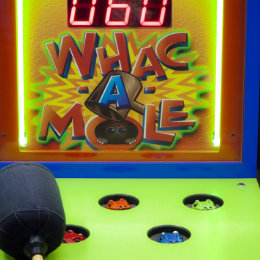A Brief Overview
About 35% of students struggle
with specific learning disabilities. As a result, the team wanted to create a
project that could impact and improve therapy treatments for children with
disabilities. Therefore, the team decided to create a prototype of a
visual therapy game that is both fun and functional. The original
inspiration for the project came from a combination of whac-a-mole and dance
dance revolution. The prototype is intended to be used as therapy and to
test a patient’s visual processing and hand eye coordination. This is
done by reading the color displayed on the LCD screen and placing a matching
colored block onto one of three lit up tiles. For the purposes of reducing
cost, our design has been simplified from 9 to 3 tiles but the game has two
levels for complexity and testing of different disabilities. These
levels are discussed below. Some challenges faced were in writing
and testing of the code where the delay time was too long and general
debugging. Also, designing and making the prototype as well as
determining size and materials and making a model of the 3D printed parts was
difficult. Communication is also really important for a project like this so
the team came up with the best strategy to communicate and met outside of class
almost every week. Once these challenges were overcome, the final product was
made to be fully functional.
Game Levels
- Level One
- LCD screen displays color. RGBs of corresponding tile are lit up green. Player must place corresponding colored block on that tile.
- Level Two
- LCD screen displays a color. RGBs of corresponding tile light up any of the three possible colors. Player must place corresponding tile to what is written, not necessarily what color the tile is lit up as.

Comments
Post a Comment